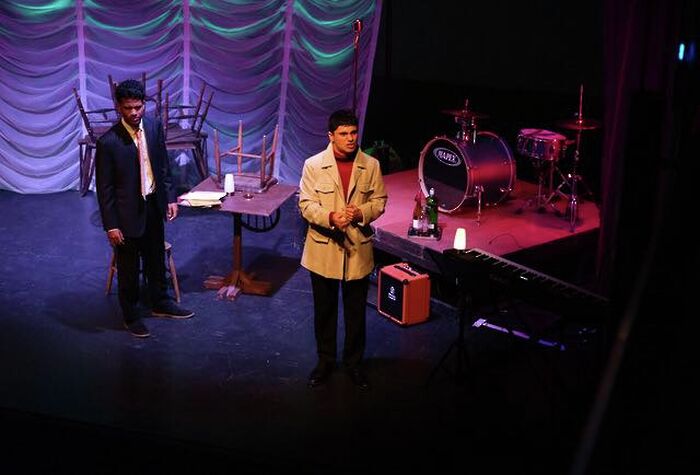The ETG’s Hamlet provides a stripped back and shocking interpretation of a Shakespearean classic
Dynamic casting and gorgeous design make Hamlet unforgettable, full of disturbing representations of madness and grief

After a two week European tour over the Christmas break, the European Theatre Group (ETG) returns to the ADC Theatre with Hamlet for their final round of performances. The resulting production is clearly polished. This Hamlet, aided by simplicity of set and costume, is one of powerful authenticity, diving into the mind of the titular prince and presenting his descent into madness with shocking believability.
This production’s brilliance is shaped by choices of characterisation made by the director (Ilona Sell), which provide a greater focus on the intricacies of the relationships within the play and, as a result, the humanity of the characters. Claudius and Gertrude’s relationship felt more passionate than treacherous, aided by wordless transitional scenes where they appear in a moment of physical intimacy on stage. Casting Polonius (Jemima Langdon) as a woman was also an interesting choice, giving scenes with her daughter Ophelia an entirely new dynamic. Instead of representing the commanding father figure and bumbling fool of other productions, Polonius as a mother enables an interesting dissection of female relationships, her commands to Ophelia to stay away from Hamlet less a guise to protect her own reputation, but rather a means of understanding and protection.
“Youthful, raw and intimate interpretation of a Shakespearean tragedy”
The set designed by Matthew Wadey was a powerful feature of this production. Bare except for a white sheet and a wooden block, the stark stage created a sense of exposure to the stripped-back performances. Working with Tonye Igali’s timeless costume design, constraints of time and place were removed and instead a kind of infinite relevance for the play was reinforced – one shaped around themes that are not bound to history. Edward De’Ath’s lighting design, full of colour, was also impressive in conveying both the ghost element and the tumultuous emotions of the play.
There was not a weak link amongst the cast, all turning in impressive performances. Despite the density of Shakespearean language, many moments of humour were found in the play. The Players (Jules Coyle and Coco Wheeler) were the source of most of the loud laughter from the audience – their careful comedic delivery elevating their scene to one of the most memorable of the evening. The second act was where the actors clearly showcased their talents. Jacob Benhayoun (Hamlet) and Sarah Mulgrew (Ophelia) embodied their characters completely.
Ophelia’s final moments on stage were particularly heartbreaking, driven by the murder of her mother and cruelty at the hands of Hamlet, she grieved centre stage, a palpable madness emanating from her. Hamlet’s demise also felt strangely human - rather than a tragic hero, Benhayoun’s Hamlet is a young man tormented by a grief he cannot deal with. Subtle body language like the itching of his skin, and less subtle, almost child-like movements of jumping around the stage and lying on the floor convey this characterization. The infamous nunnery highlighted most frighteningly the powerful acting of the two – Ophelia’s screams were beyond chilling and Hamlet’s violence was strikingly believable.
This scene, along with the rest of the play, was discomforting. Troublingly tense transitional music, skillfully composed by Anna-Maria Woodrow, added much to the growing anxiety of the play. Two additional performance highlights include Mark Jones, whose tone and mannerisms felt on par with actors I’ve seen at The Globe, and Laurie Ward’s performance of Gertrude as a mother tormented by the madness of her own son was harrowing.
This production of Hamlet was undoubtedly moving. The cast was beyond impressive, and director Ilona Sell has done an outstanding job in creating this youthful, raw and intimate interpretation of a Shakespearean tragedy. The ETG’s Hamlet felt stripped back and genuine, powerful in its simplicity. The suffering of each character was intensely believable and combined with masterful set, sound, and lighting design, contributed to an emotional performance and a disturbing representation of madness and grief.
 Comment / Plastic pubs: the problem with Cambridge alehouses 5 January 2026
Comment / Plastic pubs: the problem with Cambridge alehouses 5 January 2026 News / Cambridge businesses concerned infrastructure delays will hurt growth5 January 2026
News / Cambridge businesses concerned infrastructure delays will hurt growth5 January 2026 News / Cambridge academics stand out in King’s 2026 Honours List2 January 2026
News / Cambridge academics stand out in King’s 2026 Honours List2 January 2026 News / AstraZeneca sues for £32 million over faulty construction at Cambridge Campus31 December 2025
News / AstraZeneca sues for £32 million over faulty construction at Cambridge Campus31 December 2025 Interviews / You don’t need to peak at Cambridge, says Robin Harding31 December 2025
Interviews / You don’t need to peak at Cambridge, says Robin Harding31 December 2025










